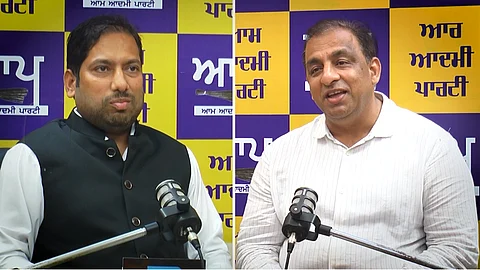

Aam Aadmi Party’s Jalandhar Central In-charge, Nitin Kohli, says stepping into active politics was a natural turn in his life. “It felt like this was the only thing left to do, and perhaps it was God’s will too. The party gave me the responsibility of Central constituency, and since then, I have devoted myself to serving the people,” he said.
Speaking in a podcast with Punjabi Bulletin channel’s Editor Imran Khan, Kohli shared that his perspective changed after directly interacting with citizens. “Earlier, I used to think problems were fewer, but when I met people on the ground, I realized how troubled they are with the system and circumstances. At such a time, a person with a sportsman’s spirit was needed—and that is what I am doing."
"From morning till evening, I meet people, listen to their concerns, and try to resolve them. Initially, many doubted whether I could deliver, but today people are happy. I answer negativity through my work. Being a sportsman, facing tough situations has always been part of my life,” he said, adding that conditions have now improved and will get even better.
"My duty is to serve people, and I will continue doing that. Politics is not my priority—service is. Earlier, I used to devote half my day to people, now as constituency in-charge, my full day goes into listening and solving their problems.”
Talking about his shift from working behind the scenes to the frontlines of politics, Kohli said he has long-standing ties with leaders and sportspersons alike. “I have always been connected to sports. When I became constituency in-charge, hockey legend Dhanraj Pillay came from Maharashtra to meet me. We spoke about serving the people,” he recalled.
Kohli highlighted his slogan ‘Sunange Vi Te Karange Vi’ (We will listen and we will act). “I tell people that all works will be done, and done the right way. Citizens are approaching us through helplines and offices, and their work is being carried out,” he assured.
He also stressed the importance of public participation in governance. “Everyone talks about cleanliness, but if each citizen contributes just five minutes, the city’s face will change completely,” he said.
Praising Jalandhar Mayor Vaneet Dhir, he added: “Perhaps no mayor has ever spent 12–14 hours daily in office. He personally monitors cleanliness drives across the city. Road issues will be fixed after the rains. The surface water project will be completed in the next one to two months. Streetlight problems will also be resolved soon. In the next six months, the city will look very different.”
On his passion for sports, Kohli revealed his project ‘Fit Central’, under which sports equipment will be installed in parks, and competitions will be held ward-wise.
“Sports bring positivity. Politicians should rise above party lines and think about the city. Instead of pointing fingers, we must work together. I had already started the Burlton Park project even before entering politics. By next June-July, with a hockey tournament, the sports hub will be ready. Recently, Cabinet Minister Dr. Ravjot Singh and cricketer Harbhajan Singh also visited the stadium. I am hopeful the project will be completed ahead of schedule.”
During the podcast, Kohli also spoke about his family’s hockey brand ‘Vijayanti’.
“My father founded it. After my graduation, I decided to take it international. We signed players like Pargat Singh, Mohammed Shahid, and Jude Felix. By the 2000 Olympics, nearly every hockey team in the world was playing with our sticks. Even Shah Rukh Khan’s film ‘Chak De India’ was shot with our hockey sticks. Later, I launched my shoe company Tracer, which is now completing 25 years. The company’s vision is to make affordable sports shoes,” he said.
Sharing a personal memory, Kohli recounted how over 5,000 sisters tied him rakhi at a function. “One sister told me she had not tied rakhi to anyone since her brother’s death. I assured her that as long as I am alive, she can keep tying it to me. That is the real joy of life,” he said emotionally.
Concluding, Kohli said: “The people of Jalandhar Central are watching my work. They can best decide whether the earlier times were better, or now.”